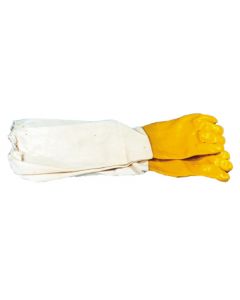Gloves
Whether you’re a beginner or an experienced beekeeper, protective gloves are a must for anyone. Our sting-resistant gloves will allow you to manipulate your honey bee beehive without exposing your bare hands to your bees. We have canvas gloves, leather gloves, and goatskin gloves to provide multiple protective options for your beekeeping needs.
What are the benefits of each material?
The Leather gloves provide the most protection typically since it's thicker than their counterparts, this can also mean less dexterity but is still one of the best choices for a glove for the best protection against angry bees.
The Goatskin gloves provide slightly lesser protection than cowhide leather gloves due to their thickness but provide more dexterity instead. Their durability is just as good as leather gloves and will still protect you from angry bees to a similar extent as leather gloves.
The Canvas gloves tend to be the most comfortable and cheaper than the alternatives. These canvas gloves are treated to be more sting resistant than traditional canvas gloves which provide little protection.

Additional things to consider
Ventilated or Normal gloves?
Ventilated gloves allow you work longer with your gloves on and will let the moisture evaporate more quickly once you are done with them. One of our gloves even have ventilation on the back of your hands providing extra airflow. Normal gloves on the other hand may be easier to wash since there are fewer different materials involved depending on your cleaning methods.
Velcro End or Elastic End?
Elastic gloves are very convenient and will let you slip on and off the gloves with relative ease while still keeping the bees out. Our ventilated heavy-duty gloves have a velcro strap making it easier to slip into the gloves for people with larger arms while still ensuring a snug fit when put on properly. Velcro is great for letting you choose the right pressure for your specific arms but making it take slightly longer to take them on and off.
How experienced are you?
The more seasoned you are the less likely you are to make mistakes. We recommend leather gloves for new beekeepers since the likelihood of getting stung is higher, these thicker gloves will reduce the likelihood of getting stung but it's not a foolproof method and you will find yourself getting shallow stings especially if the protective gloves get wet.






